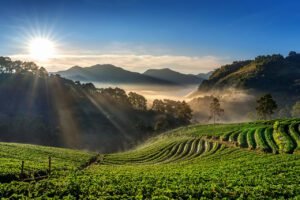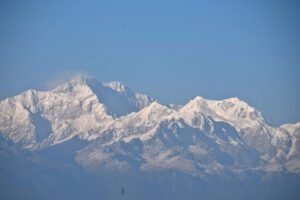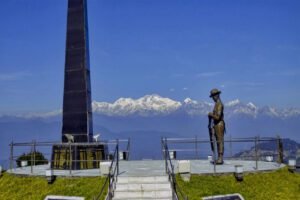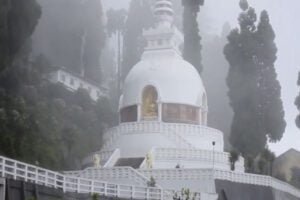Introduction
Nestled in the embrace of the mighty Himalayas, Darjeeling stands as a jewel in India’s crown, mesmerizing travelers with its breathtaking landscapes and rich cultural heritage. This article takes you on a visual journey through the scenic beauty of this extraordinary destination, giving a glimpse of its various attractions and experiences.
A glimpse of the landscape of Darjeeling
The Best Darjeeling Tour Packages 2024

Focuses on giving readers a deeper appreciation of the enchanting natural beauty that defines Darjeeling’s environment. The aim of this section is to paint a vivid picture of the stunning landscape that visitors can expect to encounter while exploring this enchanting destination.
The landscape of Darjeeling is a masterpiece created by nature, where every element blends harmoniously to create a visual spectacle. Imagine standing among rolling hills that are adorned with greenery as far as the eye can see. These hills are not just ordinary scenery; These are the iconic tea gardens that have made Darjeeling world famous.
As you look towards the horizon, your gaze catches the breathtaking backdrop of the Himalayan mountains. Snow-capped peaks rise majestically against the sky, creating a dramatic contrast to the vibrant green slopes below. The combination of quiet tea plantations and towering Himalayas creates a truly wonderful environment.
The charm of Darjeeling’s landscape lies in its ability to evoke a sense of tranquility and wonder. The rolling hills seem to stretch endlessly, inviting you to stroll leisurely and soak in the beauty that surrounds you. The air is crisp and fresh, carrying with it the scent of tea leaves and the earthy aroma of the region.
The play of sunlight and shadow throughout the day adds depth and dimension to the landscape. The rising and setting sun cast a golden glow over the tea gardens, creating a mesmerizing play of colors that change with time. This visual symphony is a photographer’s dream, offering countless opportunities to capture the beauty of nature in all its glory.
At dawn, fog and mist often cover the landscape, adding an ethereal quality to the scenery. As the mist slowly lifts, it reveals the tea bushes and their intricate patterns, while the distant Himalayan peaks emerge from the cloud cover. This transition from blur to clarity is a magical experience that fascinates viewers and photographers alike.
Tea gardens and orchards

The tea cultivation process in Darjeeling is a blend of tradition and innovation. The tea plants are nurtured with care and attention, following age-old techniques passed down from generation to generation. These techniques are combined with modern practices to ensure the highest quality tea is produced.
Picking tea leaves is an art in itself. Skilled workers, often referred to as “tea pluckers”, carefully select the freshest and tenderest leaves, which are known to produce the best tea flavor. These leaves are carefully cut by hand, ensuring that only the top two leaves and a bud are picked, as they have the most delicate flavor.
Once the leaves are plucked, they go through a series of complex steps to transform them into Darjeeling’s famous tea. The leaves are dried, rolled, oxidized and dried with precision. The timing and conditions of each of these stages play an important role in determining the final flavor profile of the tea.
Darjeeling tea is celebrated for its unique properties. Often referred to as the “champagne of tea,” it boasts floral and fruity notes that are a direct result of the region’s unique climate, altitude, and soil composition. Each tea garden produces its own flavor of tea, making every cup of Darjeeling tea a unique experience.
A visit to this tea garden gives a first glimpse of this complex process. Many gardens in Darjeeling offer guided tours, where visitors can witness the plucking process, interact with the tea pluckers and even participate in a tea-making workshop. These experiences not only educate visitors about the journey from tea plant to cup but also give them a deeper appreciation for the labor and craftsmanship involved.
Explore the attractions of Darjeeling
Darjeeling is a treasure trove of attractions that cater to a variety of interests from nature lovers to history buffs. Here’s a closer look at some of the attractions that define Darjeeling’s charm:
Tiger Hill: It’s not just a hill; This is a sunrise event. Tiger Hill is famous for offering one of the most spectacular sunrise views in the world. Visitors gather early in the morning to watch the first rays of the sun touch the snow-capped peaks of the Himalayas. The play of colors and breathtaking panoramas make this experience truly magical.

Batasiya Loop: An engineering marvel, the Batasiya Loop is a spiral railway that offers a 360-degree view of Darjeeling’s landscape. It is a popular place to catch a glimpse of the Darjeeling Himalayan Railway train as it negotiates the loop and also offers an opportunity to admire the surrounding scenery.

Himalayan Mountaineering Institute: Darjeeling’s association with mountaineering is legendary, and this institute pays homage to that heritage. Established to honor the legacy of Tenzing Norgay and Sir Edmund Hillary’s successful Everest expeditions, the institute displays mountaineering artefacts, memorabilia and provides training to aspiring climbers.
Darjeeling Zoo: Also known as Padmaja Naidu Himalayan Zoological Park, this is not your ordinary zoo. It is dedicated to the conservation of Himalayan wildlife and houses rare and endangered species such as snow leopards, red pandas and Siberian tigers. The natural habitat and conservation efforts make it a must-see.

Peace Pagoda: A symbol of peace and harmony, the Japanese Peace Pagoda stands as a serene monument that commands a panoramic view of Darjeeling and the surrounding hills. Visitors can walk leisurely to reach the pagoda and enjoy a moment of serenity.
These are just a few examples of the attractions that await in Darjeeling. Each spot offers a unique experience, be it witnessing a natural wonder, exploring history or immersing yourself in spirituality.

Exploring these attractions also opens the door to engaging with the local culture and community. Visitors often find themselves interacting with fellow travelers and locals, sharing stories and experiences that add depth to their journey. The feeling of human warmth and camaraderie creates lasting memories that transcend the physical beauty of attraction.
Darjeeling has a rich history
The history of Darjeeling is a tapestry woven with different threads, each contributing to the unique character of the hill station. Here’s a closer look at the historic journey Darjeeling has embarked on:
Colonial Beginnings: The history of Darjeeling goes back to the colonial era when it was discovered by the British in the early 19th century. The British were attracted to its cool climate and stunning scenery, which made it an ideal escape from the scorching Indian summer. It quickly transformed from a remote village to a popular hill station.
Tea plantations and economy: One of the most significant chapters in the history of Darjeeling is its association with tea. The British recognized the tea growing potential of the region and established plantations that would eventually produce the famous Darjeeling tea. The tea industry not only contributes to the local economy but also contributes to the social fabric of the region.
Cultural Melting Pot: Darjeeling’s history is also marked by its multiculturalism. The region became a melting pot of cultures due to the migration of people from diverse backgrounds, including indigenous communities, Nepalese, Tibetans and British expatriates. This amalgamation of cultures has left an indelible mark on the city’s architecture, heritage and lifestyle.
Strategic Importance: During the colonial period, Darjeeling gained strategic importance due to its proximity to Tibet and Nepal. It served as a vantage point for the British authorities to keep an eye on these neighboring regions. Historical significance is evident in the architecture, including structures such as the Governor’s House and St. Andrew’s Church.
Darjeeling Himalayan Railway: A UNESCO World Heritage Site, the Darjeeling Himalayan Railway (also known as the Toy Train) is an iconic aspect of the city’s history. Built in the late 19th century, this narrow-gauge railway was a remarkable feat of engineering, and continues to fascinate visitors with its scenic route and vintage charm.
Independence and Beyond: Darjeeling witnessed India’s struggle for independence, and its history is intertwined with the broader narrative of the nation’s struggle for independence. After independence, the city continued to evolve, embracing tourism and preserving its cultural heritage.
In contemporary times, Darjeeling’s rich history is celebrated through its museums, historic sites and festivals that pay homage to its past. Visitors can explore heritage buildings, wander through colonial-era markets, and engage with the local community to gain insight into the layers of history that have shaped the city.
Local cuisine and tastes
Taste the culinary delights of Darjeeling: Darjeeling’s local cuisine is a fusion of flavors that reflect its multicultural history and the availability of fresh ingredients from its surroundings. Here’s an in-depth look at the various culinary offerings you can enjoy in Darjeeling:
Momos and Thukpa: These iconic dishes have become synonymous with Darjeeling’s street food scene. Momos, delicate dumplings filled with vegetables or meat, often served with fiery chutney. Thukpa, a comforting noodle soup, is a popular choice, especially in cold weather.
Local Tea: Darjeeling is celebrated worldwide for its tea, and no culinary exploration is complete without indulging in a cup of the region’s best brew. From the floral and muscatel notes of the first flush tea to the robust flavor of the second flush tea, each cup offers a journey through the nuances of tea.
Nepali delicacies: Due to the Nepali influence in the region, you will find an array of Nepali dishes that showcase rich flavors. Sel Roti, a sweet and crispy rice-based donut, and Gundruk, a fermented leafy green dish, are a few examples that offer a glimpse of Nepali cuisine.
Local Bakeries: The hill station’s colonial heritage is evident in its bakeries that serve a variety of delicious pastries, cakes and breads. Enjoy a slice of nostalgia with freshly baked goods that stand the test of time.
Tea and Churros: Colonial influence is also evident in British-style tea served with biscuits or scones. Additionally, the presence of the Tibetan community in churros, a deep-fried pastry, adds a unique twist to Darjeeling’s culinary scene.
Local produce: Darjeeling’s proximity to the hills ensures access to fresh ingredients. Fruits such as oranges and strawberries grow in this region, finding their way into various foods and desserts. Locally sourced produce adds to the authenticity of the cuisine.
Explore Culinary Diversity: The local cuisine of Darjeeling is a reflection of its cultural diversity and integration of various culinary traditions. Whether you indulge in a traditional Nepali thali or savor the subtle flavors of Darjeeling tea, each dish tells a story of the region’s history and traditions.
Exploring local cuisine means engaging with the community. Many eateries are family-run establishments that take pride in offering authentic flavors passed down from generation to generation. Warm hospitality and personal touches make the dining experience not only about the food, but also about the cultural exchange.
Adventure in Darjeeling
Embracing Thrills and Excitement: Darjeeling is not just a serene landscape; It is a hub for adventure enthusiasts. Here’s a closer look at the thrilling adventures that await:
Trekking: Darjeeling is the gateway to some of the most stunning trekking trails in the Himalayas. Whether you are a seasoned trekker or a novice, there are options for all abilities. Trails like the Sandakphu trek offer breathtaking views of the world’s highest peaks
Paragliding: Fly like a bird over the mountains as you feel the thrill of paragliding. The bird’s eye view point offers a perfect launching site, allowing you to wander over tea plantations and forests with the majestic Himalayas as your backdrop.
River Rafting: The Teesta and Rangit Rivers flowing through Darjeeling provide exhilarating opportunities for river rafting. Navigate through the rapids and enjoy the adrenaline rush as you enjoy the scenic beauty around you.
Mountain Biking: For those with a penchant for speed, mountain biking is a thrilling adventure in Darjeeling. Ride through mountainous terrain, winding roads and off-road trails that offer a unique view of the landscape.
Rock Climbing: Darjeeling’s rocky terrain offers ample opportunities for rock climbing and bouldering. Test your strength and skills as you conquer challenging routes while being rewarded with stunning views from the top.
Wildlife exploration: Adventure doesn’t always mean extreme sports. Darjeeling offers opportunities to explore its diverse wildlife through nature walks and bird watching. Spot rare and beautiful bird species in the lush greenery.
Connect with Nature: Adventure experiences in Darjeeling are not just about thrills; They provide an opportunity to connect with nature in a unique way. The region’s landscapes are your playground, offering an immersive experience that goes beyond the ordinary
Every adventure is an opportunity to interact with the local environment and community. Many adventure operators engage local guides who share their insights about the region, making the experience not only about activities but also about cultural exchange.
Safety and Durability: When indulging in adventure, safety is paramount. Adventure operators in Darjeeling prioritize safety measures and provide equipment and guidance to ensure participants have a safe and enjoyable experience. Additionally, many operators focus on sustainable practices to reduce impact on the environment.
Best time to visit
Darjeeling Tour Packages
Choosing the right time: Darjeeling’s attractions change with the changing seasons and each time of the year offers a unique experience.
Below, we delve deeply into the various seasons and the unique experiences they bring forth:
Spring (March to May): Spring is a season of renewal in Darjeeling. The hills come alive with flowers and the weather is pleasant and mild. This is a great time for nature enthusiasts, as rhododendrons and orchids are in full bloom, painting the landscape in vibrant colors. Clear skies also provide stunning views of the Himalayan peaks.
Summer (June to August): Summer is a popular time for travelers to take a break from the heat of the plains. Although the temperature is still relatively cool in Darjeeling, it is also the monsoon season. Although rain is common, the waterfalls create a misty and romantic atmosphere. It is a great time for those who enjoy the mysterious beauty of mist covered hills.
Autumn (September to November): Autumn is considered one of the best times to visit Darjeeling. The monsoon recedes, leaving behind clear skies and crisp air. The scenery of the Himalayas is particularly breathtaking during this season, making it a paradise for photographers. It’s also harvest season, and you can see locals celebrating festivals like Dashain.
Winter (December to February): Winters arrive in Darjeeling and temperatures can drop significantly. However, this is still when the city takes on a relaxed and festive atmosphere. Clear skies provide stunning views of snow-capped peaks and the chance of snowfall adds a touch of magic to the landscape. This is a great time for tea lovers to indulge in a hot cup of Darjeeling tea.
Tailor your experience: The best time to visit Darjeeling depends on the type of experience you want. If you are fascinated by blooming flowers and pleasant weather, spring is the right choice. Summer is a great option for those who appreciate the enchanting romance of misty hills and monsoons. Autumn is perfect for clear views and lively festivals, while winter offers a cozy escape and snowy landscapes.
It’s important to note that the weather in Darjeeling can be unpredictable, so it’s a good idea to pack layers and be prepared for a change. The timing of festivals and local events can also influence your decision.
Plan ahead: Before planning a trip, it is recommended to check the weather forecast and local events. Booking accommodation and transport in advance, especially during peak season, ensures a hassle-free trip.
In conclusion, “Best Times to Visit” provides readers with valuable guidance, helping them choose the season that best suits their preferences and desired experiences. Be it blooming flowers, misty monsoons, clear autumn skies or snowy winter landscapes, Darjeeling offers a unique charm throughout the year, making it a destination to explore in every season.
Accommodation options
Choose your accommodation: Darjeeling offers a variety of accommodation options, so that every traveler can find a suitable place to stay. Here’s a detailed look at the types of housing available:
Luxury Hotels: For travelers who seek the ultimate in comfort and luxury, Darjeeling boasts a selection of high-end hotels and resorts. These properties offer superb amenities, impeccable service and stunning views of the landscape. From comfortable rooms to opulent suites, luxury hotels offer a premium stay experience.
Boutique and Heritage Hotels: Darjeeling’s colonial heritage is reflected in its boutique and heritage hotels. These properties often feature architecture and decor that transport guests back in time. They provide a fusion of historical allure and contemporary luxuries, ensuring an exceptional and unforgettable sojourn.
Mid-Range Hotels: Mid-range hotels offer a balance between comfort and affordability. These properties offer comfortable rooms, essential amenities and a pleasant stay experience without breaking the bank. They are a preferred option for travelers mindful of their budget.
Guesthouses and Homestays: For a more intimate and personalized experience, guesthouses and homestays are a great option. Run by locals, these accommodations offer an opportunity to immerse yourself in the culture and lifestyle of Darjeeling. They provide a warm and welcoming atmosphere, often making guests feel like part of the family.
Budget Accommodation: Backpackers and budget travelers can find a variety of budget accommodation including hostels and budget hotels. These options offer basic amenities, making them perfect for travelers who prioritize destination exploration over luxury accommodations.
Choosing the right fit: Choosing the right accommodation depends on your preferences, budget and the kind of experience you want. Luxury hotels are ideal for those who want to indulge in opulence and relaxation. Boutique and heritage hotels offer a taste of history and character. Mid-range hotels strike a balance between comfort and affordability.
Guesthouses and homestays offer an immersive cultural experience, enhancing connections with the local community. Budget accommodation is perfect for travelers looking to optimize their budget for exploration and adventure.
Advance Booking: It is advisable to book accommodation in advance to secure your preferred choice, especially during the peak tourist season. Many accommodations offer online booking options, making it convenient to plan ahead.
Go to Darjeeling
Navigating the itinerary: Getting to Darjeeling involves a combination of transport modes due to its mountainous terrain. Here is a comprehensive look at the ways to reach Darjeeling:
By Air: The nearest major airport to Darjeeling is Bagdogra Airport, about 90 km away. From the airport, travelers can hire a taxi or book a pre-arranged transfer to reach Darjeeling. The ride offers scenic views as you climb the hills.
By Train: The most iconic and scenic way to reach Darjeeling by train is the Darjeeling Himalayan Railway, also known as the Toy Train. This narrow-gauge railway offers a unique and leisurely journey through stunning landscapes, winding tracks and quaint stations. However, the toy train runs only between New Jalpaiguri and Darjeeling, covering a distance of about 88 km.
By Road: Another common option to reach Darjeeling is road travel. From Siliguri or New Jalpaiguri, visitors can hire a taxi or board bus to reach the hill station. The journey involves navigating winding roads and steep turns, offering breathtaking views along the way.
Route Planning: Choosing the best route depends on your starting point, time constraints, and travel preferences. If you are looking for an unforgettable and leisurely journey, Darjeeling Himalayan Railway is an excellent choice. It is a journey that is as much an experience as reaching the destination.
If you prefer a faster route, a flight to Bagdogra Airport followed by a road transfer is a convenient option. Road trips offer flexibility and the opportunity to enjoy the scenery as you climb higher altitudes.
Travel Advice:
Advance booking: Regardless of your chosen mode of transport, advance booking is recommended, especially during peak tourist seasons. It ensures availability and helps you plan your itinerary effectively.
Weather Considerations: Keep in mind that weather conditions, especially during the monsoon and winter seasons, can affect road and rail travel. Be prepared for changes and possible delays.
Local experience:A journey to Darjeeling is not just about reaching the destination; It is also about the landscape and the transition experience from plains to mountains. Various transportation options provide unique vantage points to appreciate the beauty of the region.
In conclusion, “Getting to Darjeeling” provides readers with a comprehensive overview of the routes and modes of transport available to access this enchanting hill station. Whether you choose the scenic toy train, a scenic road trip, or a combination of air and road travel, each option offers its own adventure and adds to the overall experience of reaching Darjeeling.
Conclusion
Darjeeling’s mesmerizing natural beauty is as much about its cultural richness. This hill station captures the hearts of all who visit, offering a rejuvenating escape from the chaos of everyday life. So pack your bags, embark on this visual journey and let Darjeeling weave its magic on you.
kalimpong-places to visit in kalimpong
Tinchuley-Offbeat Darjeeling-tinchuley homestay-Darjeeling, India
chatakpur darjeeling-chatakpur homestay-Offbeat Darjeeling
Offbeat Darjeeling-Lepchajagat-A paradise in the hills of Darjeeling, India
places to visit in Gulmarg-Gulmarg Gondola
Srinagar-places to visit in Srinagar-Best months to visit Srinagar India
little Singamari Homestay-Singamari-Darjeeling
Offbeat Darjeeling-Mirik The Beautiful Place Of Darjeeling
Offbeat Darjeeling-Little Rangeet River-Places To Visit In Darjeeling
Offbeat Darjeeling-bijanbari homestay-The beauty of Bijanbari
Offbeat Darjeeling-Sittong-Ahaldara-Places To Visit In Darjeeling
Places To Visit In Darjeeling-3 Point-triveni Darjeeling
Top 5 Places To Visit In Darjeeling-Darjeeling Weather
Places to visit in Darjeeling. (9) popular sites,and Darjeeling temperature
tourist places of jammu and kashmir
south sikkim tourist spots: captivating scenery is a photographer’s dream.
west sikkim tourist spots: Pelling best 13 place.
Know 18 Best Places in North Sikkim Gangtok to Chungthang
Nathula pass from gangtok, 7 more popular places in east Sikkim
Facts you didn’t know about Sikkim
Darjeeling Tour Packages 2024: A Visual Journey Through the Picturesque Beauty of India’s Gem





